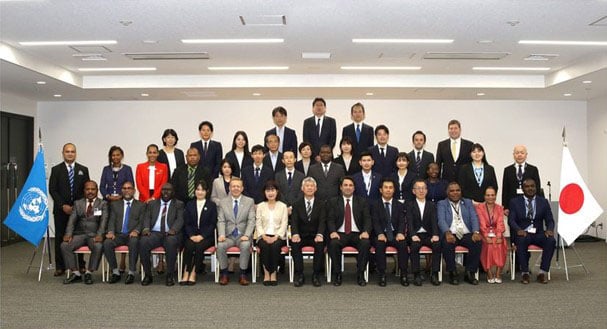Head of the Strategic Management Department at the Guyana Prison Service, Rae-Dawn Corbin, has returned home from a successful training course at the United Nations Asia and Far East Institute for the Prevention of Crime and the Treatment of Offenders (UNAFEI), stated a release on Thursday from the Guyana Prison Service.
UNAFEI is a United Nations-affiliated institute that provides training and capacity-building programs for criminal justice professionals worldwide. The institute’s mission is to contribute to the prevention of crime and the treatment of offenders through education, research, and international cooperation.
It explained that the course – the 185th – was organised under the Japan International Cooperation Agency (JICA)’s Knowledge Co-Creation Program, and brought together 19 participants from across Asia, Africa, the Pacific Islands, and South America (Guyana), to learn about best practices in preventing inmate abuse and corruption and fostering a rehabilitative environment.
Corbin, who was Guyana’s representative, was part of a diverse group of law enforcement and correctional professionals who gained valuable insights from presentations by Japanese experts, including a criminal law judge, prosecutors, probation officers, professors and a former Director-General of the Correctional Bureau, Natori Masako. Detailed presentations were also provided by visiting experts – Mikko Sarvela, Finnish Prison System Adviser to the International Committee of the Red Cross (ICRC) and Argentinian member of the Board of Directors of the International Corrections and Prisons Association (ICPA), Dr Emiliano Blanco.
According to the release, the training course provided Corbin with the chance to witness and understand Japan’s successful approach to inmate and ex-offender reintegration. She was particularly impressed by the country’s multi-faceted strategy, which involves various control bodies and departments that meet the needs of law offenders from the initial breach of laws, where the prosecution system aims to streamline disciplinary measures in no more than 22 days after arrest.
Further, Japan’s focus on addressing the specific needs of different types of offenders throughout their period of incarceration and moreover engaging over 46,000 volunteering members of society (called Hagoshis) to help each ex-offender to reintegrate into society post-incarceration, is a testament to the safety and security that prevails across the country of Japan.
Participants of the course were also taken on observation tours to reintegration shelters and homes which are operated through government and private non-profit organisations, to help parolees, probationers and ex-offenders become productive law-abiding citizens.
Corbin thanked the JICA Country Office in St. Lucia and the Government of Guyana for being selected to participate in this training program. She emphasised that the knowledge and experiences gained will be invaluable in guiding Guyana’s transformational efforts to improve its prison system, promote rehabilitation and increase the sense of peace across society.
Meanwhile, Director of Prisons, Nicklon Elliot commended Corbin for her level of dedication and commitment shown throughout the training. He assured that the Prison Directorate will continue to provide the relevant capacity building opportunities to staff which will aid in transformation of the service.






